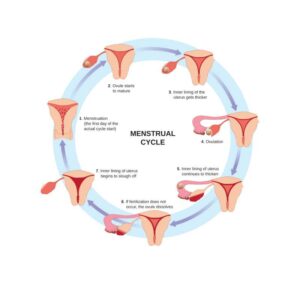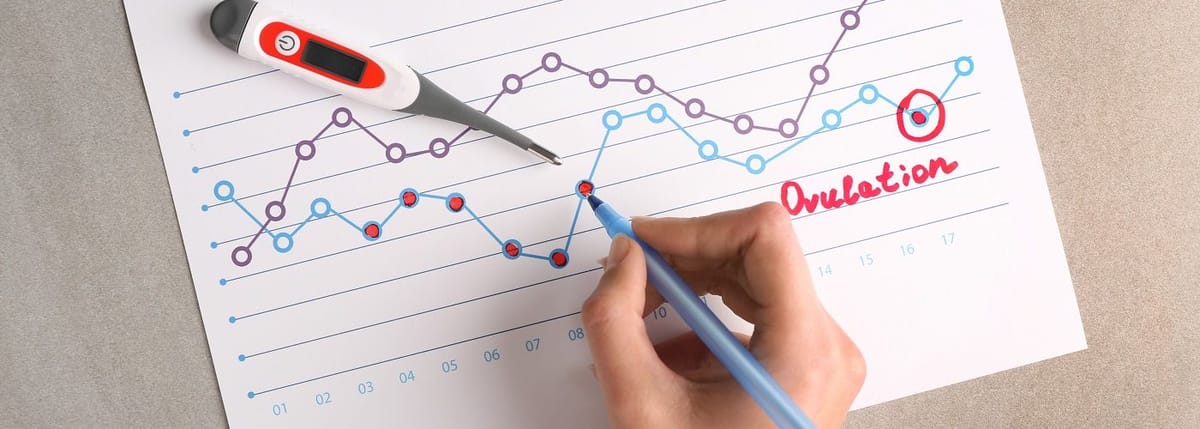
11Yes, you can get pregnant after ovulation, but only for a short time. You are more likely to get pregnant if you have sex before ovulation. This might be contrary to the picture you had in your mind of a passive egg ‘waiting’ to be fertilised by a sperm. More often it’s the other way around. How does this work? This article explains the rhythm of ovulation and how you can calculate your fertile window each month by monitoring your ovulation patterns.
To help you, we’ve set out details of the various ways that you can predict ovulation, from keeping a simple menstrual diary, to keeping a temperature chart, investing in a more high-tech fertility monitor, or keeping track of changes in your cervical mucus.
Understanding ovulation and the fertile window
To better understand how ovulation works, let’s first take a closer look at the menstrual cycle. This is the time from the start of one period to the start of the next. It lasts 28 days on average. But anything from 21 to 35 days is still within the range of normal. The cycle is divided into four phases:
- The menstrual phase, during which you have your period. This starts when an egg from the previous phase goes unfertilised, causing a drop in the hormones oestrogen and progesterone. The womb lining, no longer needed in the absence of pregnancy, is shed in normal menstrual bleeding. This phase lasts three to seven days on average.
- The follicular phase also starts on the first day of your period. The hypothalamus sends the pituitary gland a signal to begin production of follicle-stimulating hormone (FSH). This triggers the ovaries to produce around 5 to 20 follicles, each containing an immature egg. The developing follicles stimulate an oestrogen surge which thickens the uterus lining. This phase lasts from 11 to 27 days, 16 being the average. It ends with the ovulation of one, occasionally two eggs.
- The ovulation phase results when your pituitary gland is triggered by rising oestrogen levels to produce luteinising hormone (LH) which starts the process of ovulation. The released egg begins its journey down the fallopian tube to the uterus. This is the only time in your cycle when you can get pregnant. If the egg is not fertilised by a sperm, it will disappear within about 24 hours.
- The luteal phase begins after ovulation. The empty follicle becomes a corpus luteum which releases mainly progesterone to keep the uterus lining thick and prepared for an embryo to implant. If this doesn’t happen, the corpus luteum shrinks and is reabsorbed, oestrogen levels drop and your next period starts.

How long are you fertile after ovulation?
The fertile window is that part of your menstrual cycle during which you could become pregnant. It lasts not just for the 24 hours or so that the egg survives after ovulation, but also for around five days before ovulation, because this is the length of time that sperm can survive in the body. So, it’s that simple: a window of around six days, starting five days before ovulation.
Chances of pregnancy after ovulation
A number of studies have calculated the odds on becoming pregnant on key days of this window:
Same-day ovulation
The chances of getting pregnant the day of ovulation are 10% – 33%.
One day after
One day after ovulation you can get pregnant in 0% – 11% of cases.
Two or more days after
The egg is typically viable for fertilization for about 12 to 24 hours after ovulation, so after two days, the likelihood of conception drops sharply.
One day before ovulation
The chances of pregnancy one day before ovulation are around 21-30%. This is because sperm can survive inside the female reproductive tract for up to 5 days, so intercourse before ovulation allows sperm to be present when the egg is released, increasing the likelihood of fertilization.
Although 28 days is the average cycle, with ovulation on day 14, most women are not average. Also, even though the menstrual phases are predictable, they don’t happen at exactly the same time every month.
| Timing | Chances of Pregnancy | Notes |
|---|---|---|
| Same-day ovulation | 10% – 33% | Fertilization possible on the day the egg is released. |
| One day after ovulation | 0% – 11% | Egg viability decreases rapidly after ovulation. |
| Two or more days after ovulation | Less than 5% | Egg viable for about 12 to 24 hours after ovulation; chances drop sharply afterward. |
| One day before ovulation | 21% – 30% | Sperm can survive up to 5 days; being present before ovulation increases pregnancy chances. |
How can I predict my ovulation days?
It’s really important to be able to calculate ovulation, rather than knowing it’s happened after the event. There are different ways of approaching this all-important prediction.
Keeping a menstrual diary
The simplest of all methods, a diary using good old-fashioned pen and paper, or a downloadable app, keeps track of the day your period starts on each cycle and from data accumulated over a few months you can determine the length of your cycle. This is important because generally speaking, ovulation occurs not 14 days after the start of your period, but 14 days before the next period. The following chart illustrates:
- Cycle length of 24 days: ovulation day 10
- Cycle length of 28 days: ovulation day 14
- Cycle length of 32 days: ovulation day 18
Once you know the likely ovulation day, you can assume your window of highest fertility is the three days before, during and after ovulation, but that you are also fertile for the five days before ovulation through to the day after.
The cervical mucus method
As ovulation day approaches, your normal cervical mucus changes to a more slippery, thin and clear consistency which may appear something like egg white. This signals the approach of ovulation and the ideal time to have sex.
Tracking your basal temperature
Basal body temperature is the body’s resting temperature and is best tracked by checking each morning before getting up. During ovulation, you have a small but measurable rise in body temperature. By recording these changes over several months, you can predict future ovulation dates.
Ovulation predictor kits
Predictor kits work by measuring levels of LH, which triggers ovulation, in the urine. You would need to take the test for several days running to detect an increased level of LH. When this happens, it’s your signal that you will ovulate during the next 12 to 36 hours.
Fertility monitor
A fertility monitor brings together some of these measures, by tracking your temperature, heart rate and periods, as well as levels of oestrogen and LH, to give you a prediction of your ovulation date, and therefore your most fertile period.
Signs ovulation has already occurred
There are certain signs that can help identify when ovulation has occurred or is occurring:
- Changes in vaginal discharge. It becomes more abundant and clear, with a texture similar to egg whites.
- Increased libido.
- Lower abdominal pain.
- Breast tenderness or sensitivity.
- Rise in basal body temperature.
Contact us at IVI
For most women with a regular menstrual cycle, predicting your fertile window should be fairly straightforward once you understand the signals that your body is giving you. If in spite of this you feel there is something wrong, for example if your cycle is erratic and therefore unpredictable, you may like to browse our website for assisted fertility treatments that may be applicable for you. Or if you would like to discuss any fertility concerns, just go ahead and contact us at IVI.





Comments are closed here.